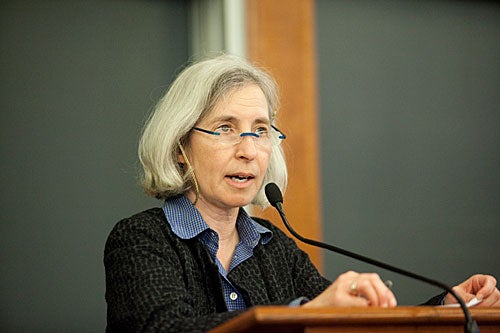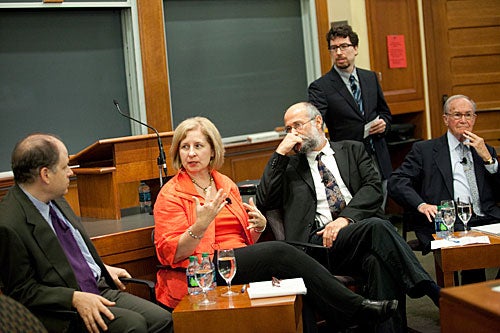Tv Is A Vast Wasteland
It's hard to envision, in the era of ambitious 24-hour political coverage, a government official telling television broadcasters what to do. But on May nine, 1961, at a meeting of the National Association of Broadcasters, new Federal Communications Committee Chairman Newton Minow did but that.
"When goggle box is good, nothing — not the theater, not the magazines, or newspapers — nothing is meliorate. Merely when television is bad, nothing is worse," Minow told his audience. He challenged the broadcasters to sit in front end of their television sets for a day, without distraction.
And so he delivered the line that would make front-page headlines the side by side morning: "I tin can assure you lot that what you will observe is a vast wasteland."
Minow'southward speech "shocked a complacent industry," said his daughter, Martha Minow, dean of Harvard Law School (HLS). "He chosen for imagination, excellence, and creativity." At Austin Hall Monday evening, both Minows hoped to stir a debate once again, while calling on contributions from the many creative minds in the room.
The Minows were joined by an all-star lineup of legal scholars, journalists, media experts, and sometime FCC insiders for "News and Entertainment in the Digital Age: A Vast Wasteland Revisited." The event, co-sponsored by the HLS Dean's Office, the Berkman Center for Internet & Society, and the Nieman Foundation for Journalism at Harvard University, produced a wide-ranging discussion on the broadened media landscape, the changing definition of the public involvement, and the role that Americans play as consumers and producers in a news culture that's more democratic than ever.

The emcee, Jonathan Zittrain, a professor of law and co-founder of the Berkman Eye, noted that the rotating panel — featuring the off-the-cuff addition of Pulitzer Prize–winning historian Doris Kearns Goodwin, among others — bore more than a passing resemblance to the 1950s game bear witness format that Minow once railed against while at the FCC.
Minow gave his famous speech in what he called "the television age," when the authorities'southward part, as he saw it, was to expand viewers' choices, hoping that increased contest would lead to better programming in news, entertainment, and children's instruction. "Above all, I am here to uphold and protect the public involvement," he said at the fourth dimension.
The industry didn't take kindly to the criticism: The producer of the one-act "Gilligan'southward Island" named the testify'southward famously sunken send the South.Southward. Minnow. But Minow'south voice communication endured, not just every bit an exemplar of American rhetoric, just as a idea-provoking mission statement on the role and responsibility of America's leading communicators.
"Tv set had get, in 1961, the dominant form of communication," Minow said Monday. "But at that place had been very footling word or contend in the land about what that meant in terms of public responsibility [and the] public interest."
Now, Minow best-selling, his grandchildren don't even ain Tv set sets. The public has nearly limitless access to news and entertainment betwixt cable television and the Internet. But the debate over what's in the public's best interest rages on, and reform is all the same needed, he said.
"Today'due south politics are dominated by coin," Minow said. Candidates spend most of their time raising money "and so they can buy radio and telly ads. They're raising money from the public to go admission to something the public owns, the airwaves. That's a crazy system."
Compounding the problem today, said panelist Jonathan Alter, a historian and columnist for Bloomberg View, is the fact that struggling news outlets increasingly do not desire to human foot the costs of investigative reporting.
"Talk is cheap, and reporting is expensive," Alter said. "The 'vast wasteland' at present has this big 'Tower of Babble' on tiptop of it."
Other panelists were more than optimistic most the new lesser-up model of news. Ethan Zuckerman, founder of the international blog network Global Voices, pointed out a recent hypothesis in the Columbia Journalism Review that says that cheaply produced, easy-to-distribute video is fast condign "a universal human language."
"Information technology needs a nifty deal of translation [and] curation to be helpful," just online video has "unprecedented power in bridging betwixt different parts of the world," Zuckerman said.
If one looks to Tv set for high-caliber entertainment, "you see anything but a vast wasteland now," said New York Times culture critic Virginia Heffernan.
Rather than fearing the ascent of entertainment civilisation, people should encompass the manner news and amusement have mingled, she said. Leaked footage of Iraqi leader Saddam Hussein'southward execution may have turned up on a shock-video website, but every bit pure reportage it was more than accurate than The New York Times coverage that appeared in the newspaper the adjacent mean solar day.
"All that [New York Times] money couldn't tell the story of what happened in that room," Heffernan said. "Video told it loud and articulate."
While consumer choice has exploded, access to new media is controlled past even fewer players than in Minow's time, co-ordinate to Susan Crawford, a law professor who was co-leader of the Obama administration's FCC transition team. The cable giant Comcast is now more powerful as a gatekeeper — both to television and Cyberspace access — than the "Big Three" networks were in the 1950s and '60s, Crawford said. If Minow were to give his speech today, the audience would be fifty-fifty smaller.
"The political bravery of this speech is unthinkable now," Crawford said. "More than always, we've got a vertically integrated business concern … where the advertisers are the clients, and nosotros are all the product."
Regulation of new forms of advice, whether television in the early on 1960s or the Net today, has always lagged behind the pace of technological development, Minow said. Thoughtful debate about those technologies has fallen even farther behind.
"Discussion of the public responsibleness" of media gatekeepers has long been neglected, he said. "And I hate to say it, merely it's neglected today."

Tv Is A Vast Wasteland,
Source: https://news.harvard.edu/gazette/story/2011/09/the-vast-wasteland-reconsidered/
Posted by: densonenterce.blogspot.com


0 Response to "Tv Is A Vast Wasteland"
Post a Comment